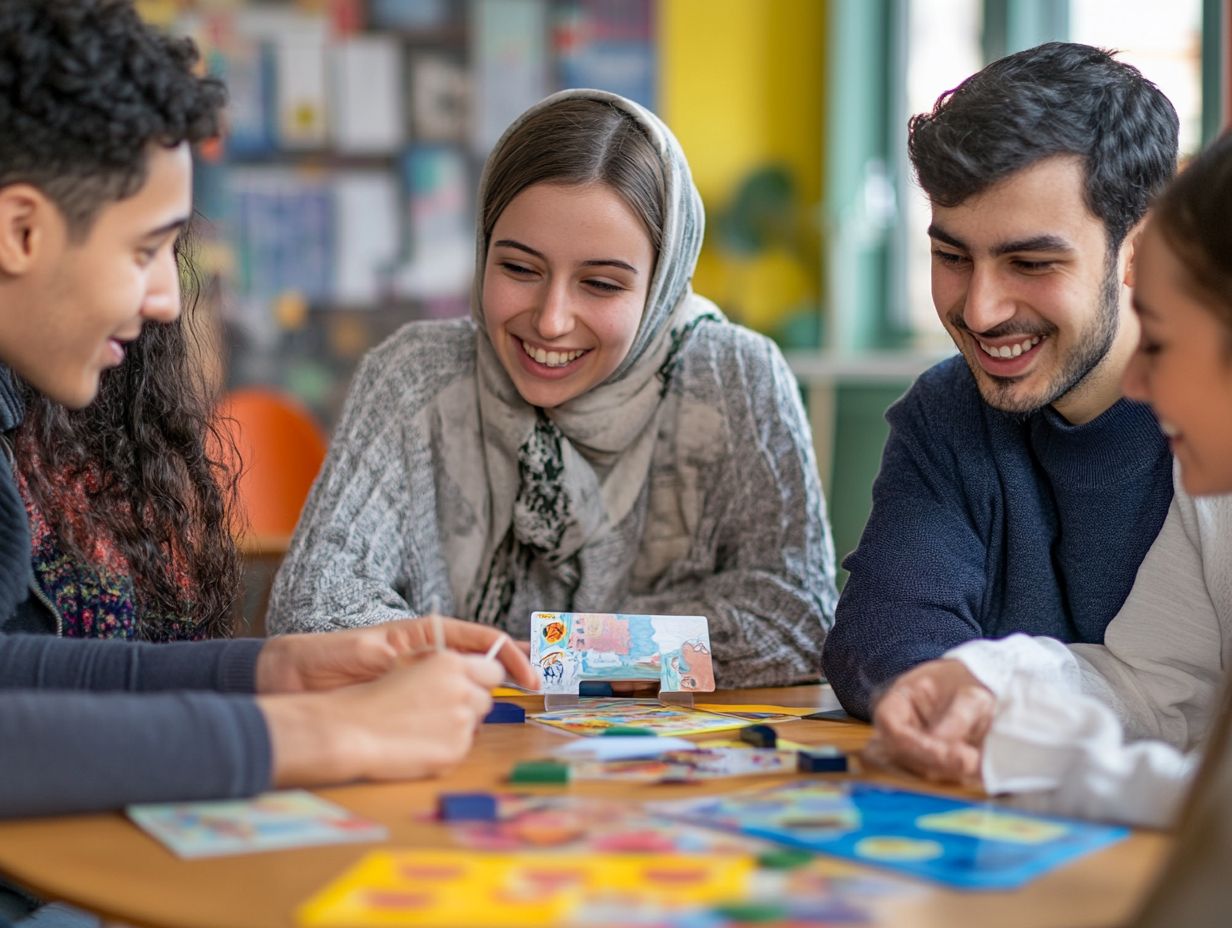5 Fun Games for Learning Languages
Are you seeking engaging ways to elevate your language skills? Get ready to discover five fun games that will make learning a new language exciting!
From an exhilarating treasure hunt to an interactive word association game, each activity presents unique advantages designed to cater to various skill levels. You ll discover how to seamlessly incorporate these games into your language curriculum, along with tips to maximize their effectiveness.
Get ready to transform your language learning journey today!
Contents
- Key Takeaways:
- 1. Language Treasure Hunt
- 2. Word Association Game
- 3. Role-Playing Game
- 4. Language Charades
- 5. Vocabulary Memory Game
- How Do These Games Help with Language Learning?
- What Are the Benefits of Using Games for Language Learning?
- How Can These Games Be Adapted for Different Skill Levels?
- What Are Some Other Fun Games for Language Learning?
- How Can These Games Be Incorporated into Language Learning Curriculum?
- What Are Some Tips for Making Language Learning Games More Effective?
- Frequently Asked Questions
- What Are 5 Fun Games for Learning Languages?
- 1. Scrabble
- 2. Charades
- 3. Memory Match
- 4. Simon Says
- 5. Hangman
- How can these games help in learning a new language?
- Are these games suitable for all ages?
- Can these games be played alone or with others?
- Are there additional benefits to playing these games?
- Do I need to be a fluent speaker to play these games?
Key Takeaways:

- Make learning a new language fun with interactive games like treasure hunt and word association.
- Role-playing and language charades can improve speaking and listening skills while making learning enjoyable.
- Games make language learning more engaging and help you remember words better.
1. Language Treasure Hunt
A Language Treasure Hunt is a brilliant and engaging activity designed to boost your language skills while incorporating enjoyable language games that truly captivate you and encourage active participation.
This approach uses a variety of digital tools to create an interactive learning environment that fits seamlessly into both educational institutions and traditional teaching methods.
Organize a Language Treasure Hunt to explore vocabulary and grammar in a fun way. Imagine clues that challenge you with action words, adjective agreements, or even common phrases that don t make literal sense, helping you apply what you’ve learned in real contexts.
Educational institutions play an important role in nurturing this activity by providing essential resources and training for educators. Leveraging digital tools such as language apps and interactive maps can significantly enhance your experience, enabling you to track your progress and collaborate with peers.
Ultimately, this makes language acquisition not only effective but also a genuinely enjoyable adventure.
2. Word Association Game
The Word Association Game is a dynamic activity that boosts vocabulary memorization and reinforces your language skills, all while keeping you engaged through collaborative participation.
This interactive game invites you to think critically and creatively, forging connections between words that deepen your understanding of the nuances of language. It s an excellent tool for language learning, offering benefits such as improved retention and spontaneous use of vocabulary in context.
With various digital tools like Quizlet and Kahoot at your disposal, you can enhance the experience even further, tracking your progress and fostering a spirit of friendly competition. The game is easily customizable for different age groups or proficiency levels; younger learners can dive into categories like animals or colors, while advanced students might explore idiomatic expressions or abstract concepts.
This versatility makes it a fun and important part of learning a language.
3. Role-Playing Game
Role-Playing Games (RPGs) serve as exceptional teaching techniques that immerse you in real-life scenarios, enhancing your communication skills and fostering cultural understanding while transforming language learning into a creative and enjoyable experience.
These games can be crafted to target specific language topics, from vocabulary related to everyday activities to cultural nuances like historical customs and traditions. You’ll find yourself engaged in scenarios designed to challenge you to use the target language effectively, prompting critical thinking and problem-solving. For additional strategies, check out these 5 tips for effective language learning.
To make the most of this activity, educators should present clear guidelines and role descriptions while cultivating an open environment for collaboration.
Assessment can focus on your ability to communicate fluently within the RPG framework, showcasing your grasp of the language and culture in practice, rather than merely in theory.
4. Language Charades
Language Charades is a fun game that helps you improve your language skills by prompting you to express vocabulary and grammar concepts through physical actions. This approach enhances your involvement in the learning process.
As you take turns acting out words or phrases without speaking, you discover a creative way to visualize language while sharpening your interpretative abilities. This game adapts easily to different skill levels. Beginners can focus on simple vocabulary, while more advanced participants can dive into complex expressions that don t mean what the words say or nuanced grammar rules.
By incorporating this playful approach, you effectively reinforce your understanding of language constructs in a lively atmosphere.
To keep the game invigorating, consider adding variations like a timer for each round or introducing themed categories. This ensures that the energy stays high and the learning experience remains dynamic.
5. Vocabulary Memory Game
The Vocabulary Memory Game is a dynamic tool designed to help you enhance vocabulary memorization while engaging students in interactive and entertaining language games tailored for the classroom.
To set up this captivating game, gather a set of vocabulary cards. You can easily create these using index cards or digital platforms like Google Slides. Each card should feature a target vocabulary word on one side and its definition or an image representing that word on the other.
This game can adapt effortlessly to online learning environments by utilizing digital tools like Flipgrid or Quizlet. This enables students to engage with vocabulary in a virtual space.
Don t underestimate repetition’s power; it significantly boosts vocabulary retention, allowing learners to make meaningful connections and build a strong foundation in language.
How Do These Games Help with Language Learning?

Games like Language Treasure Hunts and Word Association Games are essential in your language learning journey. They foster active participation and boost your engagement, transforming the educational experience into something effective and enjoyable. Exploring unique language learning techniques can further enhance your skills.
Dive into these fun methods to immerse yourself in the language, free from the pressures typically linked to traditional learning approaches.
Recent studies reveal that game-based learning can significantly enhance your vocabulary retention and comprehension skills, especially if you re a younger learner. Educators have observed that playful activities increase your motivation, making you more inclined to take risks with your language use.
Testimonials show that you not only pick up new vocabulary more quickly but also gain a deeper understanding of language nuances all while enjoying a relaxed environment that encourages exploration and sparks creativity.
What Are the Benefits of Using Games for Language Learning?
Using games for language learning brings a wealth of benefits your classroom can t afford to miss. You ll see how engaged students become, improve vocabulary retention, and master grammar in a delightful way. These techniques are invaluable in the language-learning landscape!
These games work wonders in boosting motivation by transforming mundane language practice into enjoyable experiences especially crucial for younger learners who might find traditional methods tiresome. Collaborative games promote teamwork, enabling students to communicate and learn from each other, sharpening their collaborative skills.
Research shows that language retention rates soar when concepts are learned through interactive play rather than through the monotony of rote memorization. The advantages can differ across age groups. For example, younger students flourish with dynamic, interactive games, while older or more advanced learners may gravitate toward strategic games that challenge their critical thinking and application of language skills.
How Can These Games Be Adapted for Different Skill Levels?
Adapting language games for different skill levels is crucial for meeting the diverse needs of students. This ensures that everyone can actively participate and benefit from these engaging activities while reinforcing their language skills.
By thoughtfully adjusting the complexity of rules or the content presented, you can create an inclusive environment where both beginners and advanced learners can flourish.
Take a vocabulary-building game like Word Bingo as an example. For beginners, you might focus on basic words and images. Advanced learners could delve into more complex vocabulary and even phrases.
Another effective strategy is to set tiered objectives. This allows all participants to engage with the game at their own level. During a sentence construction challenge, for instance, beginners could work on forming simple sentences, while their more skilled peers tackle intricate structures.
These thoughtful modifications not only enhance comprehension but also cultivate a sense of achievement for every participant, regardless of their skill level.
What Are Some Other Fun Games for Language Learning?
Get ready to explore the exciting world of language games! Besides the games already mentioned, you’ll discover a wealth of engaging activities that can make learning a language fun and seamlessly fit into your curriculum.
By harnessing digital tools and innovative teaching methods, you can elevate vocabulary and grammar mastery to new heights.
These games encompass a variety of interactive storytelling apps that enable you and your students to craft unique narratives. This enhances not only creativity but also language skills.
Collaborative online quizzes provide an excellent opportunity for learners to work together, reinforcing their grasp of complex grammar rules while strengthening camaraderie in the process.
Resources like Kahoot! and Quizlet offer dynamic quizzes that tailor themselves to different skill levels. This makes knowledge reinforcement both effective and enjoyable.
Language-learning apps such as Duolingo and Babbel gamify practice, transforming it into an engaging challenge that keeps learners motivated while they hone their skills. For those looking to expand their options, consider exploring 5 online language courses you should try.
Each of these resources effectively aligns with language acquisition goals, employing captivating mechanics that foster active participation and enhance retention.
How Can These Games Be Incorporated into Language Learning Curriculum?
Incorporating games into your language learning curriculum requires careful planning and alignment with your educational goals. This ensures they enhance existing teaching methods and utilize digital tools for the greatest effect.
To achieve this, strategically choose specific games that resonate with your lesson objectives. Take into account factors like timing and your students’ needs.
For example, introducing a vocabulary-based game mid-week can reignite engagement when attention might otherwise drift.
Using games as formative assessments allows you to gauge student understanding in a lively and interactive manner.
Successful implementations could include digital platforms like Kahoot or Quizlet, which provide engaging quizzing and collaborative features. Resources like Teachers Pay Teachers offer ready-made game templates tailored to various subjects, helping you save time while enriching your curriculum.
What Are Some Tips for Making Language Learning Games More Effective?
To elevate the effectiveness of language learning games, prioritize fostering active participation. Adapt your teaching techniques to accommodate diverse learning styles, and select engaging language games that closely align with your learning objectives.
This entails implementing preparatory strategies. Clearly define the goals of each game and the skills to be developed, creating a structured learning environment.
You can enhance student engagement by weaving in elements of competition and collaboration. This enables learners to thrive through teamwork while honing their language skills.
Assessing learning outcomes is equally crucial. Utilizing formative assessments during gameplay offers valuable insights into student comprehension.
Most importantly, feedback is essential in refining these game-based experiences. It equips you with the knowledge of what works, what doesn t, and how to tailor future lessons for maximum impact.
Frequently Asked Questions
Here are some common questions about language learning games.

What Are 5 Fun Games for Learning Languages?
Let these games bring your lessons to life and spark joy in learning!
1. Scrabble
This classic word game can be enjoyed in any language. It’s a fantastic way to boost your vocabulary and spelling skills.
2. Charades
Acting out words or phrases in a different language helps with memorization and pronunciation. It’s a fun way to learn!
3. Memory Match
Create cards with words in one language and their translations. This game makes practicing reading and comprehension enjoyable.
4. Simon Says
This game uses commands in the target language. It s great for improving listening skills and following instructions.
5. Hangman
A popular game that is easy to adapt for language learning is to use words or phrases in the target language for practice, as outlined in this guide on how to use games for language learning.
How can these games help in learning a new language?
These games make learning more engaging and enjoyable, and they can be paired with 5 great activities for language practice to enhance vocabulary, spelling, pronunciation, listening, and comprehension skills.
Are these games suitable for all ages?
Yes! These games can be tailored for children, teenagers, and adults. Everyone can join in on the fun!
Can these games be played alone or with others?
These games work for both solo and group play. Some are better for teams, while others are perfect for individual practice.
Are there additional benefits to playing these games?
Absolutely! They also boost cognitive skills like critical thinking and memory. Plus, they encourage social interaction and teamwork.
Do I need to be a fluent speaker to play these games?
No! These games suit all levels of language proficiency. They are a fun way to practice and improve regardless of your fluency.







